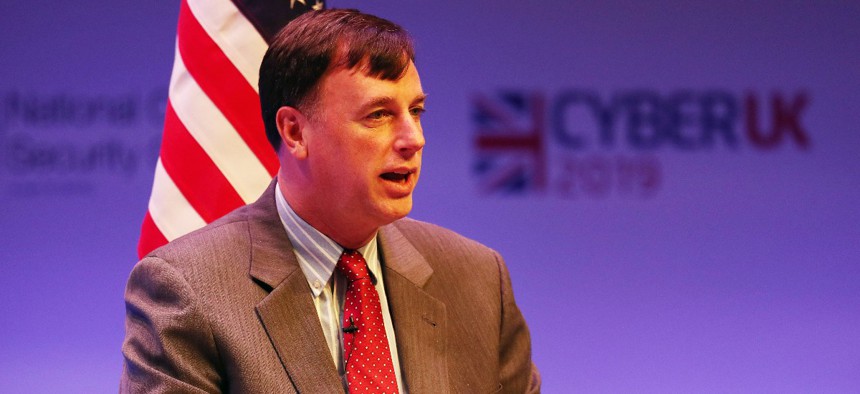NSA Advocates Active Defense, as Industry Lawyer Advises Against Incident Reports

Rob Joyce, then-U.S. Homeland Security Advisor, during a Five Eyes session: International Panel Discussion on Global Cyber Issues during CYBERUK held at the Scottish Event Campus in Glasgow. Andrew Milligan/PA Images via Getty Images
Speakers at a new conference hosted by cybersecurity firm Mandiant highlighted the challenge the government faces in motivating companies to report attacks on critical infrastructure.
Stressing the importance of industry’s role in combating harmful cyber intrusions, Rob Joyce, director of the National Security Agency’s cybersecurity directorate, outlined four areas where companies should focus their efforts.
“From the outside, a foreign intelligence agency like NSA is able to scan and look across large swaths of the ecosystem, but the precision, the detail that's inside those individual platforms, that's the domain of industry. That's where the expertise is going to know best what's normal and not normal, [and] be able to chase the breadcrumbs after something happens,” he said.
Joyce was speaking Tuesday during mWise, the new branding for cybersecurity firm Mandiant’s annual cyber defense summit. Mandiant split last September from FireEye which voluntarily disclosed a breach of their systems via the government IT management vendor SolarWinds during a hacking campaign that went on to compromise more than a hundred public and private organizations, including nine federal agencies.
Industry was instrumental in responding to recent cyberattacks against Ukraine, Joyce said, appealing to the private-sector entities that might be expected to assist with similar events in Taiwan, other allied nations, or within the United States. He said companies should first harden their environments; second, actively defend them; third, contest adversary actions; and finally, increase the scale of their activities.
“Defense means [having] an active stance,” Joyce said, for example. “There are ongoing operational activities, not passive structures. I couldn't tell you the number of times we've helped on an incident response, where either [a logging mechanism] wasn't on at the beginning, or it was there and nobody was looking through it to figure out the malicious activity underway. So defense means paying attention to what's going in and out of your network, recognizing what doesn't belong and rapidly taking steps to eradicate it.”
Activities like logging will be crucial for successful implementation of the Cyber Incident Response for Critical Infrastructure Act, which Congress passed in March as a response to the events surrounding the SolarWinds incident. The law tasked the Cybersecurity and Infrastructure Security Agency with establishing rules for critical infrastructure companies to report incidents to CISA along with information that may be captured by such logs, which could be useful in analysis to prevent cascading impacts of an attack targeting common supply-chain elements.
But a panel discussion following Joyce’s keynote address highlighted a challenge still facing the U.S. government: industry’s reluctance to share any information that might make them liable for any harm resulting from an incident.
“We really are trying to cloak a lot of what we do in privilege, and facts are never privileged,” said Lisa Sotto, a partner at the law firm Hunton Andrews Kurth. “There are things like [penetration] tests that won't be privileged. Those are organizational measures that are not not for the purpose of advising counsel to provide more effective legal advice.”
Sotto spoke alongside the chief information security officers for SolarWinds, Colonial Pipeline and software provider Kesaya, all of which were breached with significant spillover repercussions last year. She also advised not sending CISOs—who know “all of the gory technical details”—to testify before Congress. CEOs who do a good job of it will stand a better chance of defending a company’s reputation after a breach, she said, sharing other tips to avoid any blame for a successful intrusion.
“Apologies can be a lawyer's nightmare,” Sotto said. “So there's a way of apologizing without actually accepting culpability … you can say, ‘I'm sorry, this happened,’ rather than ‘I'm sorry, we had lax security protections in place that allowed this to happen.”
Sotto advised erring on the side of not producing a report in the wake of a cyber incident, suggesting it could be used in a lawsuit against the company, despite efforts to invoke attorney-client privilege.
“One of the questions that we're always asked after an event is 'should we get a report?' The answer to that may be 'no.' Because if we have a report, we tend to have a fight over privilege with respect to that report,” Sotto said. “Even if we retain a forensic investigation firm, under privilege, there's always a fight, so if you don't need it, chances are good you probably shouldn't be getting it.”
Other advice Sotto shared suggested companies would have to spend time—precious during an incident response operation that aims to mitigate the impact of an attack on other potential targets—parsing any report they create on a cybersecurity incident for evidence of negligence.
“You may need a report to give to your customers, your business partners,” she said. “If so, understand that you'll waive privilege on that report … If you get a report, the one very key recommendation is not to put recommendations for safeguards or enhancements in that report. Separate a recommendations report from an incident response report.”
The success of the CIRCIA law will largely depend on provisions seeking to assure companies that reports shared with the government under the new rules won’t be viable in such court cases. It will also depend on the goodwill of the reporting entities, as some observers of the legislation, including Sen. Mark Warner, D-Va., have noted an absence of teeth for its enforcement.
NEXT STORY: Cyber Talent Still in High Demand






